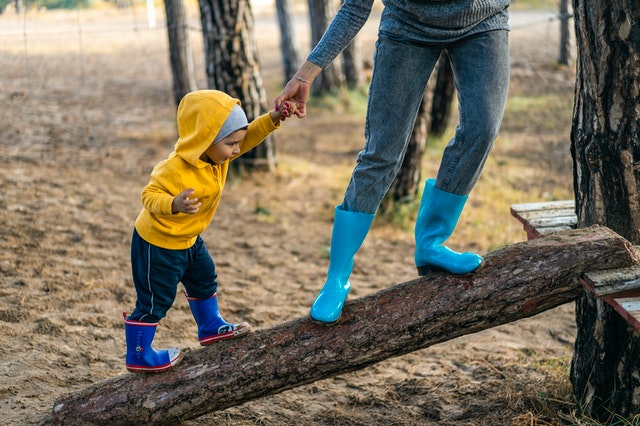Throughout my childhood and before I became a mother, my extended family was, besides being mostly newly and nominally religious, what most people would describe as close. There were three living generations descended from or related to my grandfather who spent a lot of time together at my grandparents’ house, and celebrations like New Year’s Day, weddings, and birthdays filled the rooms and gardens with people and laughter.

For the most part, the units formed in my mother’s generation by marriage and birth were distinct from the whole, but only to the degree to which we defined one another as cousins or uncles and aunts. The only relatives we didn’t feel a close bond with lived either in Northern Nigeria or in England, and even then, we visited them as often as we could. For those family members who lived in our base of Lagos, Nigeria, the work of raising my generation was distributed on the basis of opportunity and expertise among the adults. As such, for most of my life, “family” was a collective concept—a large group of people whose shared blood fostered goodwill and support.
My grandmother, who had a background in education, conducted or supervised after-school lessons for any of the grandchildren who needed them. Discipline and correction could be meted out by any adult, but the most egregious cases were reserved for my mother and grandfather. (I wager this was because of their impressive ability to unperturbedly watch recalcitrant adolescents beg for mercy, as they stood with trembling muscles on one leg with their arms spread.) Affection was freely given and freely received by the children, and on Sundays after church, my grandfather would pile us into one of his Mercedes Benz cars to go buy ice cream. To my childhood self, it was a happy and mostly safe family, and its conservatism was not apparent to me because I existed within its confines.
Growing up, the implications of gender were rarely readily apparent to me. I was quick-witted and humorous in a way that the adults—especially my grandfather and mother—encouraged. I was a star student, an athlete, and an active churchgoer, eventually becoming a teen leader. My biggest failing was my utter dislike of cooking—a feeling that not even the much-bemoaned hunger pangs of my future husband and children could change. Then I got pregnant out of wedlock in my final year of university and chose not to terminate the pregnancy, and for the first time in my life, I was firmly outside of the boundaries of what my family considered acceptable female conduct.
My grandfather had passed away ten years before my pregnancy, and my mother had been holding the family together by managing his estate and doing the emotional labour of maintaining the kinship bond. Because I had never noticed the patriarchal lines along which my family organized itself, it did not occur to me that her leadership and power within the family might be considered unusual. Despite her being the second child and female, her being in charge was simply what was sensible. She was in a similar line of work to grandpa—the one with whom he enjoyed the closest relationship following the death of his favourite of his two sons—and she alone had functioning relationships with all of her siblings outside of the collective camaraderie. In retrospect, I realize that this was not because my family didn’t quite ‘do gender’, but because my mother didn’t.
In our nuclear family, my mother was also the anchor. My father was abusive and mentally ill—albeit not necessarily in that order. My relationships to my siblings and father mostly radiated out from my and their relationship to my mother; she was a stabilizing force, our centre of gravity. After I had my daughter, people often asked why I didn’t get an abortion since the procedure is quite common in Nigeria despite being illegal. I would respond by saying “because I knew my family would support me no matter what.” Like with the gender question, I didn’t realize until much later that what I meant was “I knew my mother would support me no matter what.” To a certain extent my mother, while she was alive, embraced feminist politics out of necessity. The circumstances of her marriage and career made it such that she simply could not afford to settle into conservative womanly roles, even if she had been so inclined—which she wasn’t.
My mother, who was secretly ill with cancer, died when I was six months pregnant. Until the day it happened, it never occurred to me that she could die, even though in the two weeks we spent together prior to her death, I saw her sicker and weaker than I ever had before. I was in school finishing the first semester of my final year, and my sister later informed me that mummy didn’t tell me much because she felt that my pregnancy was upheaval enough. While I was away at school I had no idea how ill she was or even that she had cancer. She called me every other day, texted me on her Blackberry more than she ever had before, and showered me with love. I thought it was because I was pregnant and scared. In conversations with my sister after her passing, it became clear that it was also because she was dying and afraid for me.
Contrary to what most people around me believe due to the trope of the “single mother who overcomes great odds,” the great difficulty of my life was not becoming an unwed mother—it was losing my own mother in the same breath. Suddenly, I was in the world without the maternal protection I had taken for granted, and it was not long before the cracks started to show. I hadn’t realized that my mother had been almost alone in bearing the responsibility of keeping our family a community or that people within the collective had taken our cues on how to treat one another from her. She had been the central figure with whom they had a long history of love and trust; she was the only one able or willing to do the work of tempering excesses or dampening the hunger to gain and wield power over my grandfather’s wealth and other family members. She was the only one whose life was an undeniable example of female power, autonomy, and leadership.
I don’t doubt that my mother’s fear for my future was connected to her knowledge of what lay behind the shield she had been for me. My mother inherited her father’s no-nonsense, pragmatic, and clear-minded decisiveness; it allowed her to recognize the existence of obstacles just so that she could surmount them. Because she routinely flew in the face of gendered illogic by simply existing and excelling at the intersection of opportunity and expertise, she was the type of woman people called a man as a compliment. Furthermore, any backlash her unyielding nature might have generated was tempered by her clear devotion to her husband and marriage: she was a virtuous woman, dedicated to her God and her man. Her willfulness was, thus, forgivable. Unfortunately, in passing down family traits, my mother endowed me with her iron will but somehow neglected to pass down the faith or fidelity that made her stubbornness easier to swallow. As such, her willfulness was forgivable; mine has never been.
In the historical Oyo Yorùbá world-sense, as described by Oyèwùmí, Oyèrónké in her seminal work What Gender Is Motherhood?, there is no higher status than that of Iya—the mother. Conceived as both a biological and spiritual role, motherhood and mothering conferred an unquestionable, fixed seniority—and, thus, immense social value—on the mother. The birth of children was constructed as divine in the society; children were received as the ultimate objective of life itself, and the raising of children was considered a collective effort of utmost importance. Questions of marital status and the paternity of children were secondary considerations, which could not impinge upon motherhood status and which did not significantly affect the support offered to the mother or the care received by the child.
However, this mindset barely survived the incursion of colonization or its deliberate delegitimization of local ways of thinking, which favoured hierarchical and dehumanizing logics. The combination of patriarchal subjugation of people understood to be women, a perverted insistence on regulating consensual sexual contact, and the promotion of monogamous, church- and state-sanctioned heterosexual marriage as the only valid outlet for (men’s) sexual desire proved lethal. Almost inexorably, the concept of the legitimacy of children—and by extension, of motherhood—took hold.
Because the birth of children outside of wedlock results in immediate devaluation of young women (making abuse of said young women even more acceptable than the norm), young unwed mothers in Nigeria often leave the responsibility of raising their children to their own mothers, with the children frequently believing their birth mothers to be their siblings. Pregnant young women are also often hastily married to the father in order to restore some sort of respectability to the mother, child and family.
My daughter was born amid my family’s unchecked collapse into flagrant patriarchal conservatism. Or perhaps the birth of a female child to me, an unmarried young woman, in the absence of my mother simply provided an avenue for what had always been there to reveal itself. In any case, we were the easiest and most logical targets for filial recalibration. First, my grandmother’s siblings tried to manipulate the father of my child into marrying me at a family meeting, to which my body but not my input was invited. After perhaps an hour of being carefully chided for his role in devaluing me as a potential wife to someone else, my daughter’s father mentioned that he had repeatedly asked me to marry him and I said no. My great-uncles and aunts looked at me properly for the first time, their faces contorted in confused shock. The meeting dissolved into chaos when I confirmed the claim, and I was shepherded outside so they could convince themselves that I didn’t know what I was saying.
My refusal to marry the man was not a feminist decision, not in any conscious way at least. But I had known even while sleeping with him that I didn’t want a future with him; getting pregnant due to a convergence of inadequate sex education and failed coitus interruptus had not changed that. I had taken for granted that my family would be there for me in the same way it always had, so I was oblivious to the whisperings and grumblings that surrounded my pregnancy. I was completely ignorant of the great upset that was my having brought my grandmother’s first great-grandchild into the world without having first been transferred into the ownership of a man via marriage, but my obliviousness was only natural. My grandmother had jumped to her feet and danced when I told her the news. My mother had asked me, somewhat rhetorically and with a voice full of sadness, “how did it happen?” and then she had taken me to buy amala when that was all I wanted to eat. To me and the women who raised me, my pregnancy was merely a bump in the road, so it did not occur to me that other people saw it as a full stop and resented me for not feeling the same.
Over the years, I slowly learned how naive I was, how unwed mothering in my society is in many ways an exercise in navigating abuse, and how much of that abuse comes from within the family. My mother was a single mother for several years after she kicked my father out for his violence, but she did such an excellent job of shielding us from the social impacts of that decision that it never occurred to me that there was something wrong with single motherhood. Thus, the expectation that young women who have children out of wedlock must perform shame and offer their lives up to be controlled by external parties, especially their families, was new and quite absurd to me. I also resented the fact that because I had gotten pregnant by accident, I was perceived to be totally and permanently irresponsible and, worse, incapable of directing my own life or making important decisions about my child and her care.
My awakening to feminist politics coincided neatly with my daughter’s infancy, and in the first year of her life, I decided that I wanted to raise my child as free of abuse as possible. To me, this meant not hitting her, not talking down at her, not trying to control her, not shaming her about her body, and not promoting harmful gendered ideas in her upbringing. I wanted her to feel even freer to explore the world and claim space in it than my mother had made it possible for me to feel. I observed how differently people treated her when they thought she was a boy (which, until fairly recently, happened often). Noticing how much more open people were to her high energy and mischief when they misgendered her made it even more important to me to find ways to circumvent their predispositions towards limiting her due to her gender.
My feminist politics also informed a strong aversion to the way in which children’s choices and bodies are violently policed in Nigeria, such that any evidence of autonomy or will is treated as disobedience or insolence deserving of severe punishment. Also of particular concern were the ways in which people minimized or dismissed inappropriate physical contact and sexual misconduct or abuse, despite or even because of how pervasive it is in this country. Finally, I was committed to maintaining my identity as an independent individual, alongside my motherhood status. My desire was to be a good mother and a fulfilled person, so I continued to pursue personal happiness to the best of my ability. Unfortunately, I didn’t realize quite how costly these ideas and decisions would be. I didn’t know that my clear-mindedness about what I wanted for myself and my child would be received as arrogance and disruptiveness deserving of violent pushback.
As a feminist, I am committed to rejecting patriarchal ideas in their entirety. My mothering is led and guided by my child’s individual needs and development rather than by externally dictated norms. It is crucial to me that my child understands that “girl” can mean something different to her than it does to the rest of our society. This is why I encourage her freedom by modelling the same at whatever cost. This is why I indulge her curiosity, her pleasure, and her awareness of her body as a vehicle that must be cared for rather than a gilded cage from which she must regard an undiscoverable world. I refuse to teach my child to shrink herself. I also refuse to send her the message that her version of the world must be a shrunken one in order for her to be safe. I encourage her to trust her own mind and intuition by validating what she thinks and feels. I try to remain open to the lessons she offers me in how to live with kindness and integrity, and I teach her about her own power to shape the world by telling her stories about powerful women, including her grandmother.
If patriarchy is the logic of social organization, then anyone who rejects patriarchy is a threat to social order. By the time my daughter was two, the treatment I received at the hands of my family and other older adults who had been part of my life through my mother had deteriorated significantly, especially as it became increasingly clear that I was intent on choosing the course of my life regardless of social norms or pressure. The support I received upon my daughter’s birth was slowly and systemically withdrawn in the wake of each of my so-called transgressions. I was punished, in various ways, for each deviation from the path of repentance or respectability: refusing to marry; failing to display that I was ashamed and had learned my lesson by abandoning a social life and my male friends in particular; entering into a new romantic and sexual relationship when my daughter was eight months old; refusing to end that relationship simply because my family considered it improper; getting birth control; abandoning Christianity, etc.
I was asked to move out of the home of the relatives who took me in after my mother’s death and my daughter’s birth because they felt that I might corrupt their teenage daughter. Family members made this decision despite being fully aware that my daughter was only five or six months old. I was earning a pittance at my first job—my daughter’s father was not supporting us financially or otherwise—and the only housing option available to me at the time was my late mother’s home, where my brother and mentally ill, treatment-averse father lived, who also had a well-known history of physical violence.
About a year after my aunt asked me to leave her home at her husband’s behest, an older family friend who was considered an aunt physically assaulted me, locked me in her home for two days, and seized my mobile devices because I had left Christianity and also refused to end the romantic relationship that was one of my few sources of comfort and support at the time. When I made it clear that even if I ended the relationship, I would not be returning to church, she told me “sinners” were not welcome in her home.
I was forced to move back into my mother’s house, despite knowing it was potentially unsafe for me and my child. Unfortunately, my mostly good relationship with my brother, who also lived there with his family, then began to deteriorate almost in direct (inverse) proportion to my levels of certainty about what I did and didn’t want for my daughter and myself. He increasingly saw no problem with crossing my personal or parenting boundaries; he would shame and verbally abuse me for not cooking for or cleaning up after him, or attempt to convince me that I deserved to be unhappy for having a child out of wedlock. He also made serious threats of physical violence on more than one occasion, including in front of my toddler, for reasons such as my having gone on a weekend getaway with my then boyfriend (while my daughter was safe with my sister), my refusal to let him hit my child as discipline, or my refusal to let him intimidate a male visitor of mine.
My brother, despite having been raised almost exclusively by women in general and my mother in particular, ended up being one of the first-line enforcers of patriarchal control in my family. It was increasingly apparent as I became more serious about the boundaries of his influence in my or my child’s life that there was no physical, emotional, or psychological harm that he was not willing to threaten or commit in order to demonstrate my subordinate status in the family and in society. I eventually severed all ties with him when in an argument that started because he refused to take instructions about my mother’s company from my older sister since he “could never defer to a woman,” he tried to silence me by screaming that I “hated men” because I had been raped.
After this incident, I moved away to my grandmother’s already crowded house with my then two-year-old daughter. I thought it would be safe for both of us because it was the same house I had spent so much time in as a happy and mostly unencumbered child. Unfortunately, I was forced to move out again not long after when I found out that one of the distant relatives also living in the house had sexually abused multiple children. I was horrified to learn that several members of my family were aware of this and my aunt had, in fact, taken one of his victims to the hospital, but no one considered it necessary either to enforce consequences for his actions or to inform me so that I could limit his access to my child. When I confronted the aunt who had taken this teenaged abuser’s victim to the hospital, she asked me to “give him the benefit of the doubt.” All of these incidents reified the idea I already had: my family—like many families in conservative, hyper-religious Nigeria—is in many ways inherently unsafe for women and girls, and to parent my child safely and in safety, I would need to distance myself from them.
In navigating the minefield that my family became in the wake of motherhood, feminism has been a double-edged sword. Early on, it provided me with the tools to recognize the ways in which my abilities and experiences were delegitimized because I was an unwed mother. It helped me to envision and enact ways of loving my child that validate and protect her. But it also reinforced my new social location as an unruly and transgressive woman, which made the withdrawal of support and protection justifiable to those who should have offered it. Still, being able to parent my child in this way—rather than accepting harm for choosing to be a mother or allowing my child to be exposed to abuse—is worth it to me. I believe it is better to be without blood family than to capitulate to ideas of fictive kinship that require me to accept ongoing violence while indirectly teaching my child that this is what it means to be a woman in the world.
Parenting in this way has taken a toll that rarely offers relief besides the reward of watching my daughter thrive, especially since like much of my own family, her other blood parent generally chooses not to contribute meaningfully to the effort. Not only have I had to parent with the support of no family members except my sister, I have also had to dedicate a good amount of my emotional energy to protecting both my child and myself from my family’s harm. Without my mother, whose presence would have acted as both shield and source of support, my family is no longer a safe place, and my need for support, community, and guidance has been treated as negotiable or secondary by the people who would ordinarily be my first port of call. If mothering is generosity and if mothering requires giving, nurturing, and depletion, where do young unmarried women who often come to motherhood scared and doubting themselves go for replenishment?
Unfortunately, as long as Nigerian families remain unquestioningly founded on Eurocentric ideas of marriage and hierarchical gender relations, as long as kinship is organized around notions of love that cannot exist without domination, and as long as women’s status within the family is conditional upon our silence in the face of abuse and our willingness to conform to social norms that hurt us, it will be safer for mothers like me to parent outside of the family. Thus, I have evolved away from my childhood idea of family as a blood-based tie. Instead, my goal is now to envision and build a family community for myself and my child that does not require, in exchange for its support, my bruised and bloodied acquiescence to our dehumanization.
Instead of my blood family, I look to the communities of women that I have found and created for support, guidance, and healing comfort when things get difficult. In teaching my daughter that “girl” can mean whatever she wants it to, and in grieving and honouring my mother who made “woman” whatever she wanted it to be, I am fashioning “family” into what I need it to be: a place of safety and love—at any cost, no matter what.



